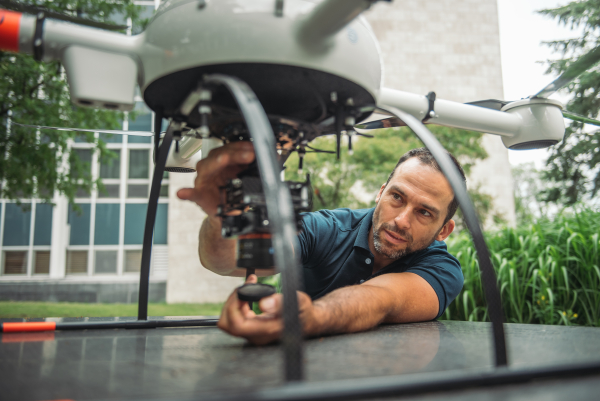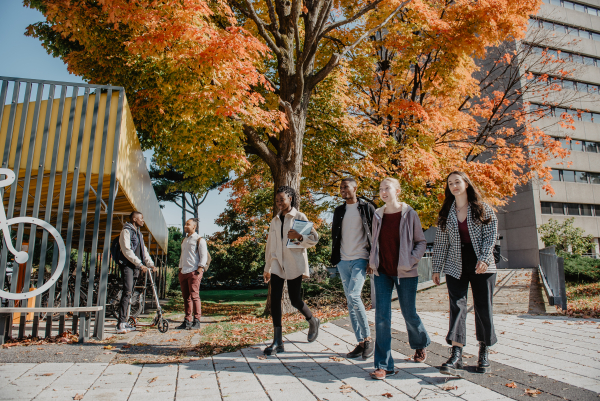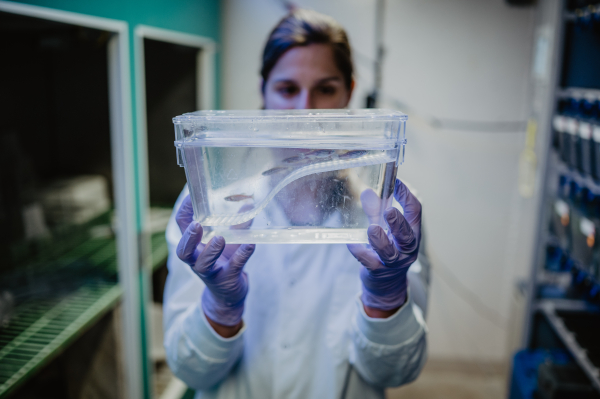UN Sustainable Development Goals
The University’s sustainable development actions over the coming years will be guided by the UN’s Sustainable Development Goals.
A shared vocabulary
Sustainable development (SD) has occupied a central place at Université Laval since its approach was created in 2007. The University has since chosen to remain heavily involved in global efforts in this area. As such, it subscribes to the 17 sustainable development goals (SDGs) adopted by the United Nations. The SDGs are a “call for action by all countries—poor, rich, and middle-income—to promote prosperity while protecting the planet” (United Nations, 2022).
In recent years, this commitment has been renewed and extended to integrate SD principles and contribute to achieving the SDGs in our practices. At Université Laval, this contribution is made primarily through teaching, research, creation, and innovation activities.

Our contribution to achieving the SDGs
The University takes part in several international certifications to support its continuous improvement and remain abreast of SD best practices.

Times Higher Education Impact Rankings
Times Higher Education (THE) is a British organization specializing in world university rankings. THE’s Impact Rankings go beyond traditional teaching and research indicators, instead ranking universities based on their ability to change the world. Participating universities are assessed against the UN SDGs.
Learn more about the ranking methodology
2023 highlights
Thanks to the dedicated work of its community, Université Laval ranked 14th in the world among the 1,591 participating universities. This makes it the top-ranked university in the French-speaking world and the 5th in Canada.
Our flagship actions for each SDG
We have not yet participated in the THE Impact Rankings for this goal. However, you can read about our community’s contributions to this goal in our 2021–2022 Social Impacts report.
2023 Impact Ranking: 4/647 with a score of 88.5%.
The goal of zero hunger responds to concerns about food waste and food insecurity alike. It concerns everyone, whether they are part of the university community or not. Over the past year, several initiatives have been taken at Université Laval to improve the food situation for both staff and students.
- We have made several sustainable food choices, including an annual measurement of food waste to understand our situation and raise awareness about the matter.
- The student body offers a number of initiatives aimed at reducing food insecurity among its community members, such as the graduate students’ association’s (AELIÉS) community fridges and the Table du pain food pantry.
- The Faculty of Agriculture and Food Sciences offers a range of classes on food security and sustainable agriculture for local farming communities. These include online training, Agriteliers, and the Agriculture, Food and Consumer Week (links available in French only).
- Université Laval makes its Food Technology Laboratory (link available in French only) available to everyone, enabling them to design new products or test innovative processes.
Focuses for improving our contribution:
- Combatting food waste
- Reducing single-use items
- Transforming the campus food system
2023 Impact Ranking: 76/1218 with a score of 80.8%.
Climate change is creating consequences on every level, from planet to people. Several people have reported that their eco-anxiety is worse than ever. For the university community, well-being and healthy lifestyle habits are essential foundations for contributing to the achievement of the SDGs. Several different initiatives help everyone adopt a lifestyle that is healthier for them and for the planet.
- The University has established a number of collaborations to accelerate research in health-related fields, with projects such as the RespiVIR International Associated Laboratory (link available in French only).
- The student community has created a mental health network called Les Lucioles de l’Université Laval (link available in French only), which helps students recognize psychological distress and understand the resources available to them.
- The University allows the Quebec City community to access its PEPS recreation complex (link available in French only).
- The Faculty of Medicine includes social responsibility in its strategic planning and makes it a central pillar in its research and education activities (link available in French only).
- For over ten years, the Mon équilibre ULaval program (link available in French only) has been offering different activities to promote healthy lifestyle habits.
Focuses for improving our contribution:
Maintaining and enhancing prevention programs, as well as support and counselling services, for students in the areas of counselling, academic success, mental health, and disability
Continuing to develop screening tools to better understand the community’s health and well-being before health issues arise
Reimagining spaces to create environments that support healthy habits, learning, collaboration, and well-being
We have not yet participated in the THE Impact Rankings for this goal. However, you can find out more about our community’s contributions in our 2021–2022 Social Impacts report, and discover the teaching and research component of our sustainable development approach.
2023 Impact Ranking: 48/1041 with a grade of 70.8.
Sustainable development cannot be achieved without a just and equitable society. The University has adopted several policies to reduce gender inequality and provide a safe environment for all.
- The EDI policy (available in French only) is designed to ensure a diverse, inclusive, and equitable environment, free from discrimination or bias, in the fulfillment of its mission.
- The student parent policy (available in French only) aims to support student parents in achieving their goals.
- The Institut Équité, Diversité, Inclusion, Intersectionnalité has set up the Femmes et STIM: en route vers l’égalité (link available in French only) project to encourage women and girls to choose careers in science, technology, engineering, and mathematics and provide them with the tools they need to do so.
Focuses for improving our contribution:
Supporting and promoting a culture of equity, diversity, and inclusion within the University
Making the University a culturally safe environment for First Peoples students and other equity-seeking groups
We have not yet participated in the THE Impact Rankings for this goal. However, you can read about our community’s contributions to this goal in our 2021–2022 Social Impacts report.
We have not yet participated in the THE Impact Rankings for this goal. However, you can read about our community’s contributions to this goal in our 2021–2022 Social Impacts report and in the Energy section.
2023 Impact Ranking: 101–200/960 with a score of 66.4–71.5.
For Université Laval, creating a decent workplace for everyone is an essential part of sustainable development. As such, it ensures the well-being of all of its staff by offering several initiatives and levers.
- The University has adopted an EDI policy and an equal employment opportunity program (both available in French only) to ensure that its environment is diverse, equitable, inclusive, and free from discrimination and bias in the fulfillment of its mission.
- The University has adopted a procurement and contract management policy, a responsible procurement strategy (link available in French only), and a code of conduct for suppliers that promotes responsible procurement, particularly with regards to the fundamental rights of individuals and employees.
- Members of the university community can turn to the Ombudsman’s Office (link available in French only) if they feel their rights are not being respected or that they have been the victim of an injustice during their professional or academic career at Université Laval.
Focuses for improving our contribution:
Maintaining and enhancing support, coaching, and counselling services for staff members in matters of health and well-being at work
2023 Impact Ranking: 87/873 with a score of 89.
To achieve sustainable development objectives, we need to rethink our infrastructures and industrial processes. The University encourages innovation by offering entrepreneurial opportunities and promoting research into new processes that are sustainable for both the environment and society.
- Every year, the University holds a Global Entrepreneurship Week event (link available in French only), which incorporates themes related to responsible entrepreneurship. Participants are encouraged to adopt responsible and innovative practices early in their careers so they can stand out from the crowd and drive change in the industry.
- Université Laval hosts a number of chairs in educational leadership (CLEs, for chaires de leadership en enseignement), which promote innovation in their fields. They include:
- the CLE in biostatistics and analytical development (link available in French only)
- the CLE in edible insect production and primary processing
- the CLE in teaching sustainable private forest management (link available in French only)
- the CLE in developing entrepreneurship and entrepreneurial spirit (link available in French only)
Focuses for improving our contribution:
Intensifying the application of SD principles in the development, renovation, and redevelopment of real estate assets
Supporting responsible entrepreneurship
We have not yet participated in the THE Impact Rankings for this goal. However, you can read about our community’s contributions to this goal in our 2021–2022 Social Impacts report.
We have not yet participated in the THE Impact Rankings for this goal. However, you can read about our community’s contributions to this goal in our 2021–2022 Social Impacts report.
2023 Impact Ranking: 9/674 with a score of 90.7.
We need to innovate in our production practices and transform our consumption patterns to play our part in the social and environmental transition.
- The University has integrated a number of responsible procurement criteria into its policies, particularly with regard to food and procurement (links available in French only).
- The University has adopted a sustainable development policy that includes statements on the responsible management of waste residual materials (including hazardous waste) and the reduction of plastic and single-use items.
Focuses for improving our contribution:
- Pursuing our efforts to reduce waste at source and move towards a zero-waste campus
- Reinforcing the use of SD criteria in procurement processes
2023 Impact Ranking: 9/735 with a score of 83.1
As the world struggles to cope with a climate emergency, the university community is mobilizing around climate action to not only fight climate change, but also create and implement measures to mitigate and adapt to its consequences.
- Since 2006, the University has been producing annual inventories of its greenhouse gas (GHG) emissions (available in French only) to better understand its climate footprint, apply innovative reduction solutions, and offset remaining emissions.
- As of 2015, the efforts of the community, especially the Facilities Service, to reduce GHG emissions have enabled us to achieve and maintain carbon neutrality.
- The Faculty of Medicine is diversifying its academic offer with a new short graduate microprogram in sustainable health and climate change (link available in French only). This program equips students to address the challenges of climate change in the healthcare field.
- Université Laval works with NGOs, local communities, and government agencies to help them incorporate the fight against climate change into their activities. We work with organizations such as Mon climat, ma santé; the Institut nordique du Québec; Sentinel North; and the Observatoire québécois de l’adaptation aux changements climatiques.
Focuses for improving our contribution:
- Setting reduction and compensation targets for Scope 3 emissions
- Developing a new climate action plan
We have not yet participated in the THE Impact Rankings for this goal. However, you can read about our community’s contributions to this goal in our 2021–2022 Social Impacts report.
2023 Impact Ranking: 7/586 with a score of 94.5.
Proud of its green spaces and aware of the part it can play in protecting biodiversity, the Université Laval community uses its expertise to encourage the adoption of sustainable forestry and agricultural management practices.
- Université Laval was the organizer of the 5th World Congress on Agroforestry, an event that promotes the conservation and sustainable use of soils.
- As part of its work in the Montmorency Forest, the Faculty of Forestry, Geography, and Geomatics has adopted integrated management plans (FMM-A and FMM-B – documents available in French only). They aim to maintain and expand existing ecosystems and their biodiversity, both plant and animal, particularly threatened ecosystems.
- The Faculty of Agriculture and Food Sciences has set up the Camp agricole; Agriculture, Food and Consumer Week; and awareness programs for local communities on sustainable soil management (links available in French only).
Focuses for improving our contribution:
- Updating our campus biodiversity inventory
- Honouring our commitments to biodiversity (link available in French only)
2023 Impact Ranking: 14/910 with a score of 87.
Sustainable development would be impossible in a society without social justice. Members of the university community are helping to make Quebec’s institutions, including the University, more accountable, inclusive, and efficient.
- The University’s governance is based on a number of democratic processes (link available in French) designed to promote stakeholder representation, recognition of independent student unions, and academic freedom.
- The University is committed to active research in local communities through the Accès Savoirs program (link available in French).
- Professors provide advice and scientific expertise to local, regional, and national government bodies.
- The University offers a range of training courses and capacity-building activities for decision-makers and legislators. These include continuing education courses offered by the Collège des administrateurs de sociétés and the Master’s Degree in Public Affairs (links available in French only).
Focuses for improving our contribution:
Bringing the University closer to civil society’s SD needs and facilitating engaged research, learning through engagement, and service to communities
2023 Impact Ranking: 30/1625 with a score of 93.7.
The interdependence of the SDGs underlines the need to build partnerships and involve all stakeholders in society. It is only by working together that we can develop and implement the solutions needed to achieve the SDGs. Recent initiatives by the university community are further proof of our conviction that shared effort is essential for the SDGs.
- Université Laval actively participates in the development of national and regional governmental and non-governmental policies on the SDGs through the Institut Environnement, Développement et Société (link available in French only) and the ArcticNet network.
- The academic community participates in several cross-sector dialogues on the SDGs, including data collection and sharing of best practices. Collaborations include: Together Ensemble, IEDS Summer School, SDSN-Canada, UniLab, Universities Canada, and Accélérer 2030 (some links available in French only).
- The Institut EDS collaborated on the drafting of the international guide for universities on accelerating education for the SDGs.
- Université Laval has created a number of free, university-quality MOOCs (massive open online courses) on sustainable development and its issues.
- The University Library provides digital educational resources on sustainable development. These resources contain free, reliable, high-quality, self-serve educational materials.
Focuses for improving our contribution:
Strengthening, mobilizing, and developing international academic partnerships to co-construct the practices essential to achieving the SDGs

Annual report and indicators
Each year, in its annual report, the University recounts the many achievements of the university community in contributing to the achievement of the SDGs. While they represent only a tiny fraction of what is accomplished, these stories bear witness to the social impact of the University’s activities. Read the 2021–2022 Social Impacts report.
The University has also set up progress indicators for each of the SDGs to assess its operational and governance progress in terms of sustainable development. See the 2021–2022 progress indicators.

EDS integrated approach
Interactions between the 17 SDGs are complex. Scientists in multiple disciplines need to work together if we are to find ways to create a more sustainable development model that respects environmental limits while still satisfying basic human needs.
To this end, the Institut EDS has developed an integrated approach to the SDGs designed to foster interdisciplinary collaboration among its members.